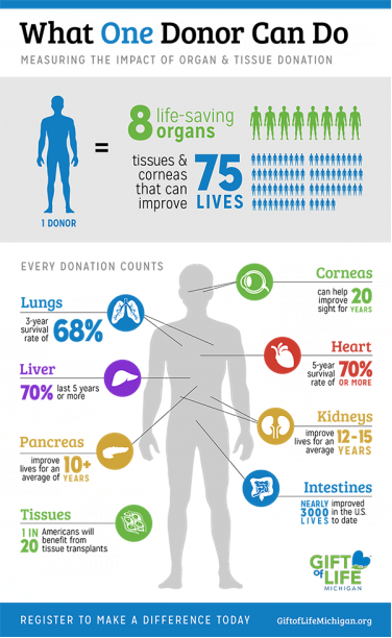
By Abigail Mathew, Alliance for Sustainability Intern
Would you like to give hope to over 100,000 people? Fortunately, you can do just that by signing up to donate an organ! Every day in the US it is estimated that 20 patients die because of the lack of donor organs. You might be hesitant because of the spread of inaccurate information, so I will start by debuffing some common misconceptions about organ donation.
Rebuffing Popular Myths about Organ Donation
One popular myth is that the hospital staff won’t work as hard to save your life if you choose to donate your organs. Instead, the Donor Network of America says it is the opposite as doctors and hospital staff will focus all their attention on you when treating you and give you the best care possible. They won’t base their care of you on your decision to donate your organs or not.
Imagine this next scenario of signing the death certificate of a loved one only to see a finger move a little later. This is another popularized misconception that you won’t be dead when signing the death certificate because they will be rushing to “steal” your organs. It is quite ironic that this theory is so popularized because Tara Santora’s article points out that people who agree to organ donation are given more tests (at no additional charge) to determine that they are indeed dead. So, the hospital staff aren’t rushing at all to mark you as dead, but rather doing the opposite.
Society has also spread the idea that sometimes people are too old to donate their organs. There is no defined cutoff age for donating organs because organs don’t have an expiration date on them. Logically speaking though you want to use your best discretion on whether certain organs are the most suitable for donation. For example, if you died of lung cancer you wouldn’t want to donate your lung, but you could still donate your heart or kidney if it doesn’t have any preexisting conditions.
A popular misconception is that organ donation will go against people’s religions. Actually, organ donation is consistent with the beliefs of most major religions. According to the Health Resources and Services Administration, these religions include Roman Catholicism, Islam, most branches of Judaism and most Protestant faiths. However, if you’re unsure with your faith’s position on organ donation, ask a member of your clergy.
Another reason people stray away from organ donation is they think that rich and famous people go to the top of the list when they need a donation. It is important to emphasize that popularity and financial status are not considered in organ donation.
With all this being said, I hope some of your misconceptions have been cleared. Otherwise, there are more misconceptions and frequently asked questions on Donate Life America’s FAQ Page. so now let’s talk about a few specific reasons as to why you should consider donating your organs when you die.

Why You Should Consider Organ Donation
Many families say that knowing their loved one helped save or improve other people’s lives helped them cope with their loss. It gives them the reassurance that even though their loved one has passed away that they can prevent someone else from experiencing that same pain.
It is especially important to consider becoming a donor if you belong to an ethnic minority. The reason is that some blood types are more prevalent in certain ethnic minority populations. Matching blood type is usually necessary for transplants, so the need for minority donor organs is especially high.
If these reasons haven’t convinced you yet, this last one will be sure to blow your mind. You can make a difference to not just one person, but you can potentially save as many as 75 lives! Think about all the organs in your body, they each could save a life!
How to Sign Up to Be an Organ Donor
- Register with your state’s donor registry – Most states have registries, and you can check the list at www.organdonor.gov
- Designate your choice on your driver’s license – You can designate this choice when you obtain or renew a license.
- Tell your family and friends – If all else fails, make sure your family and friends know your wishes regarding organ donation.
